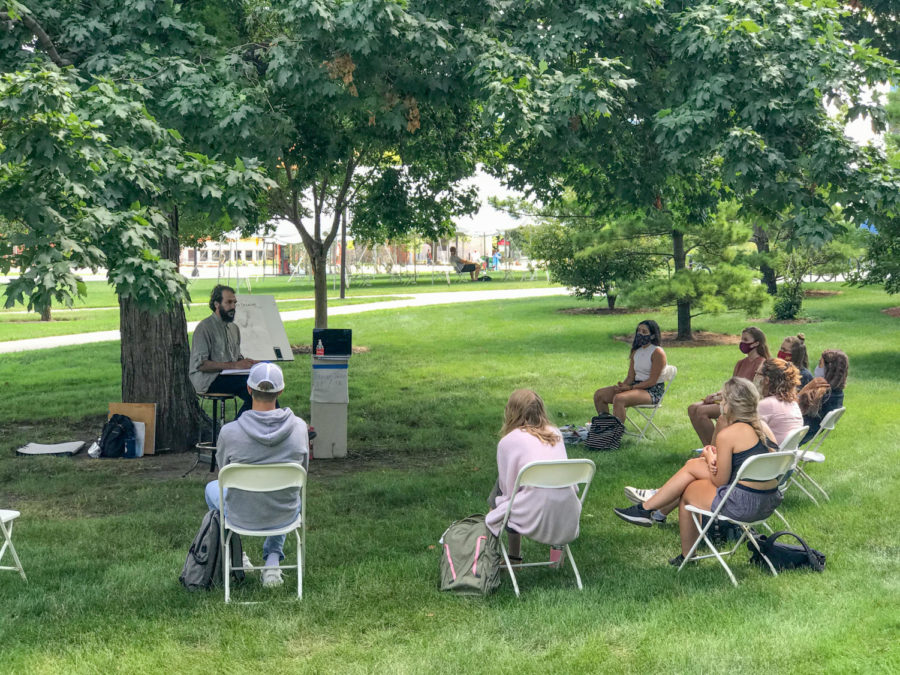Iowa State administration leaders talk first days of in-person classes
August 17, 2020
The Iowa State administration has been preparing for in-person learning for months, and the day has finally come. After the first day of classes, administration leaders remain hopeful for the continuing year.
Jonathan Wickert, senior vice president and provost, said the Iowa State faculty has redesigned 7,318 classes to be in-person, hybrid or virtual, making some experiential, hands-on learning more available. Forty-four percent of total classes have an in-person component.
“One of the things we prioritized from the very beginning as we were planning for the fall was the experiential learning component of our curriculum, so our laboratories, studios, student clubs and student organizations,” Wickert said. “We know that the great deal of learning and what really makes that residential experience so important is the ability to learn by doing. One of the things I’m proud of is we are offering over 80 percent of our laboratories face-to-face or with an in-person component. It’s really a testament to the creativity of our faculty for being able to do this in a safe way.”
Wickert expressed how proud he is of all of the staff who worked hard to find a way for students to come back on campus and how innovative professors have been with their teaching arrangements.
“One of the things I saw in a class over in the Student Innovation Center was a faculty member who had half of her students online up on a call on a video screen in the classroom while the other students were live in the classroom,” Wickert said. “They were all having a conversation; it was amazing to see. The faculty member was doing such a fantastic job of engaging all students in the conversation.”
College of Design Dean Luis Rico-Gutierrez said he saw innovation in design classrooms as well. As the weather permitted, professors were teaching on the lawns in front of the design building under tents for shade, and students were still wearing masks and social distancing. He said the first component is health and safety for students and staff.
“The other component is about culture. We’ve done a couple of things I think will really help us in the long run,” Rico-Gutierrez said. “The most important one is to help students to understand our criteria to make decisions and to ask them to lead. I’m not sure how it works in other colleges, but I know a lot of alumni after the moment they graduate go and become leaders in their community really quickly. I tell our students now, ‘For better or worse, this year, you’re going to have to become leaders a little bit earlier.’”
He said another goal of the College of Design is to empower students to make the right decision and care for the safety of others as well as themselves. He said the college is prepared to accommodate students with hearing difficulties by supplying staff with transparent masks and microphones to use when necessary.
“At the end of the day, it’s this concept of partnering with each other,” Rico-Gutierrez said. “I think we are asking our faculty to be flexible and asking our students to be flexible. Trust the faculty, speak with them and find a solution together.”d
Dean of the Ivy College of Business David Spalding said his college gave faculty and staff members with underlying conditions the opportunity to pursue alternative working arrangements, such as working remotely rather than on-campus.
“We also have accommodated students who felt that they needed to have their courses done completely online,” Spalding said. “That includes students who are concerned about being here and would prefer doing their course of study online. We really worked with everybody to make schedules work as best they could so they could learn content in the way they feel most comfortable.”
Spalding said there has been a lot of concern expressed by faculty and staff after the large gatherings last Saturday on “801 day” with students not following social distancing.
“While we can enforce behaviors in the classroom, we really can’t control what’s going on outside of the classroom,” Spalding said. “So it’s really, really important that students follow the guidelines that we suggested from the Cyclones Care campaign.”
The Ivy College of Business has prepared their classes mostly themselves, putting plexiglass up and marking off seats in the classroom. Eight feet is blocked off at the front of the classroom to give faculty members ample distance. Janitorial staff is to disinfect and clean classrooms every day.
“I hope that we have a chance to complete the semester,” Spalding said. “Plans have been laid out to continue through the rest of the semester. Students really asked for this; we surveyed students after the spring semester, and they made it clear that while they felt the online experience was going really well and they appreciated the work faculty put in to doing it online, they really wanted to be back in the classroom.
“To do that, we all have to step up and be willing to make some changes to our normal behaviors to make sure that we can [return to in-person learning] in a way that remains healthy and mitigates as much risk as possible.”







